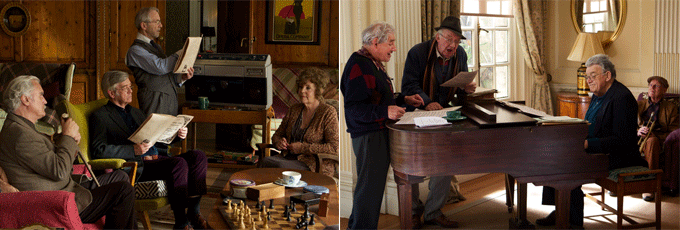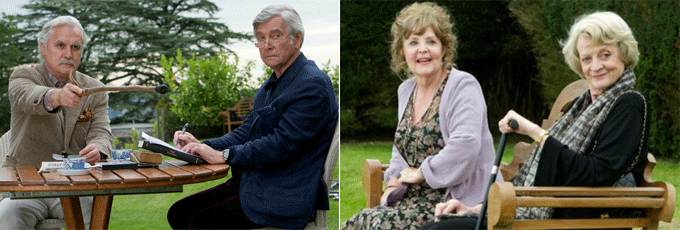With each fall of the curtain, another moment of an artist's life ends. On stage, artists are beloved performers; behind the scenes, they are human beings, searching for satisfaction and happiness, challenged by the monstrous arts apparatus, often failing to find balance between the pressures of success and the demands of personal life. The biographies of performing artists are filled with the accomplishments and reveries of those we admire but whom we tend to forget once they step off the stage.
Dustin Hoffman's directorial debut, Quartet (2012), screened during the 6th Panorama of the European Film, tells the story of the residents at Beecham House, a home for retired opera singers and musicians.
When introducing the annual performance prepared by its dwellers, Dr Lucy Cogan, a young physician (played by Sheridan Smith), describes the Beecham House as home to "talented performers and gifted musicians who find renewed energy when they anticipate a performance in front of the audience. It keeps them young. Their love of life is infectious and gives us faith in the future."
The Quartet film is based on a play by the same title written in 1999 by Sir Ronald Harwood. Both works draw their fundamental idea from Tosca's Kiss, a 1989 documentary about Casa di Riposo per Musicisti Fondazione Verdi, a mansion built by composer Giuseppe Verdi in Milan, Italy, to accommodate old singers who did not manage to assemble sufficient means during their younger years. By reaching to the less fortunate opera singers, Verdi did not wish to create a shelter, but rather a home of music, where retired artists could seal their lives with the dignity they deserve.
Quartet takes place inside the wonderful architecture of Hedsor House, an 18th century Georgian-style mansion, and against the captivating backdrop of the Buckinghamshire landscape. Though the residents' years of glory are long behind them, their lives are not free of turbulences, hopes and memories, as they are ready to rekindle their dreams and even relight love. Quartet becomes a scene for each of the stars to adopt a unique role and – after years of withdrawal from the spotlight – to shine in front of the audience, once again.
The film opens with a remarkable scene to "Brindisi" from Verdi's La Traviata, in perfect synchronisation with the details of the cinematic movement. Accompanied by music in all of its colourful accents, the viewer moves from a pianist warming up, a singer undergoing a medical examination, a director adjusting his makeup and inspecting the wardrobe, the room of a singer, a cellist, a clarinettist... to a collective rehearsal for the gala or, in other words, "a celebration of one of the greatest composers for human voice," as one of the film's characters describes Verdi.
Throughout the movie, the spectator is flattered by an outstanding choice of music which carries us through the scenes as though it were a character itself. The visual riches and the unfolding events are accompanied by works ranging from Haydn and Boccherini, Verdi and Puccini to Saint-Saëns, in addition to the film score by Dario Marianelli.
Bach's famed Toccata and Fugue in D minor is a perfect choice to accompany the complex interrelations between art and the artists, who are in their last minutes of preparation before stepping on the stage.

Music in the making... Two stills from Dustin Hoffman's 'Quartet'
A palette of characters
"Opera is when a guy gets stabbed in the back and, instead of bleeding, he sings," says retired tenor Reginald Paget (played by Tom Courtenay), borrowing the words from Robert Charles Benchley (1889-1945), an American humorist, actor and newspaper columnist. "In opera we sing opera feelings. Opera is simply the outpouring of all the emotions that all of us carry inside us," Paget explains to the young students who attend music theory lessons at the mansion.
Quartet is a palette of a variety of musicians, each with his own accomplishments, dreams and hidden pains.
Diva Jean Horton, who never received less than 12 curtain calls, is wonderfully captured by Maggie Smith. She shocks with her sharp tongue juxtaposed against her feminine vulnerability. A highly combative and self-oriented perfectionist, or as Paget puts it "more ambitious than everyone," Horton is highly respected and embodies the moving story of an artist who juggles between career and personal life only to step off the stage at the peak of glory.
"When did you last sing? This morning in the shower? Has anybody heard you recently? Any idea of the noise you make?" Jean Horton tells the residents of Beecham House, calling their determination to continue singing "insanity." Under the layer of this seemingly hostile star, one discovers the fragile soul of an artist who hates to disappoint and longs for recognition both on stage and in personal life.
But in the world of artistic glory, one cannot have it all. "I love singing, and I like my life; you can't have both, can you?" Paget poignantly notices. His bitter though truthful remark echoes in another scene when soprano Cissy Robson (Pauline Collins) addresses her colleagues saying: "I've got no husband and no children. I've got you, all of you."
Horton and Paget are frozen by the memories. Horton's obviously unparalleled fame helped her forget the price she paid for choosing career over life. Paget, a no less renowned former singer, finds it hard to move forward... As how much of the future still remains?
While choosing a more positive approach to the bitter reality, Robson, who reveals symptoms of dementia, charms with her light-spirited demeanour. She is aware, however, that "Old age is not for sissies," a famous observation that the scriptwriter borrowed from renowned American actress Bette Davis (1908-1989). In his turn, Wilf Bond (played by Scottish actor Billy Connolly) invests time in innocent flirts, probably to suppress the sad reflections shared by the Beecham House residents with moments of witty joy.

Two stills from Dustin Hoffman's 'Quartet'. Left: Billy Connolly as Wilf Bond and Tom Courtenay as Reginald Paget. Right: Pauline Collins as Cissy Robson and Maggie Smith as Jean Horton.
"All great artists need a great director"
Quartet is the collective journey of characters attempting to recapture the remains of their past. Some of them consciously struggle against time, others pretend to ignore the passing of the years and adopt somewhat eccentric attitudes.
Quartet, however, goes beyond the characters to validate its theme on two levels. On the one hand, the plot looks into the lives of characters who present very convincing stories. Each of them hopes to grasp his faded glory or falls into despair over the ended past. At the same time, almost the entire cast consists of remarkable actors and musicians who, despite being today in their 70s and even 80s, do not cease to gratify with their creativity and skill.
Apart from the four renowned protagonists, the cast also includes numerous accomplished and mostly retired singers, musicians and actors. Among them are: Gwyneth Jones (born 1936), a Welsh dramatic soprano known for her roles at the Metropolitan Opera, the Royal Opera House, Teatro alla Scala; Patricia Varley from Carl Rosa Opera Company; John Georgiadis, leader of the London Symphony Orchestra and music director and conductor of the London Virtuosi Chamber Orchestra; Graeme Scott, principal viola with the BBC Symphony Orchestra (1980-1988) and Ronnie Hughes from Frank Sinatra's Orchestra, to name but a few.
Cedric Livingston (played by Michael Gambon), an ostentatious opera director who calls the rest "cretins" and prescribes to himself notions of the others, coins an important aphorism: "All great artists need a great director."
Melancholy, entwined with gentle humour, topped with sporadic linguistic pinches, coddled by a rather simple plot, would not suffice to grant the film positive reviews from film critics. Yet the movie was nominated for the 2013 Golden Globe for Best Performance by an Actress; it won Best Narrative Feature at the 2012 Chicago International Film Festival, and Breakthrough Directing at the 2012 Hollywood Film Festival. Livingston's words, therefore, allow us to point to Dustin Hoffman as an important factor behind Quartet's merit.
Although the film is not likely to make its way to the annals of most remarkable cinematic works, it certainly is no mere caprice by a 75-year-old first time director who, incidentally, expressed on several occasions his regret for not having thrown himself into directing earlier.
In general, the script well reflects many truths about the lives of opera singers and musicians, yet it does include a few comments of a less realistic nature. For instance, it is very unlikely that Dr Lucy Cogan would think it necessary to introduce a famous British conductor -- whose portrait hangs on the mansion's wall -- to the diva that Jean Horton is. It is Dustin Hoffman's skill, however, that managed to iron out such imperfections within a well-directed story.
In Quartet, Dustin Hoffman raises the curtain on the other side of the world of performing arts. He looks at the life of performers after the lights and years of glory have faded. While being in his 70s himself and carrying an impressive luggage of success and recognition, Hoffman reached to his experience as an artist on the screen and as a man off the screen. He gave evidence of a deep understanding of the bitter-sweet world of performing arts by creating its truthful cinematic portrayal.
Quartet will be screened during the 6th Panorama of the European Film on the following days:
Wednesday 27 November, 9.30pm at Plaza Cinema, Americana Plaza Mall, Sheikh Zayed
Friday 29 November, 10.30am at City Stars Cinema, Omar Ibn Al-Khattab Street, Nasr City
Sunday 1 December, 10.30am at Plaza Cinema, Americana Plaza Mall, Sheikh Zayed
Tuesday 3 December, 3.30pm at Galaxy Cinema, 67 Abdel-Aziz Al-Saud St, Al Manial
Tuesday 3 December, 6.30pm at City Stars Cinema, Omar Ibn El-Khattab Street, Nasr City
Complete programme of Panorama of the European Film
Short link: